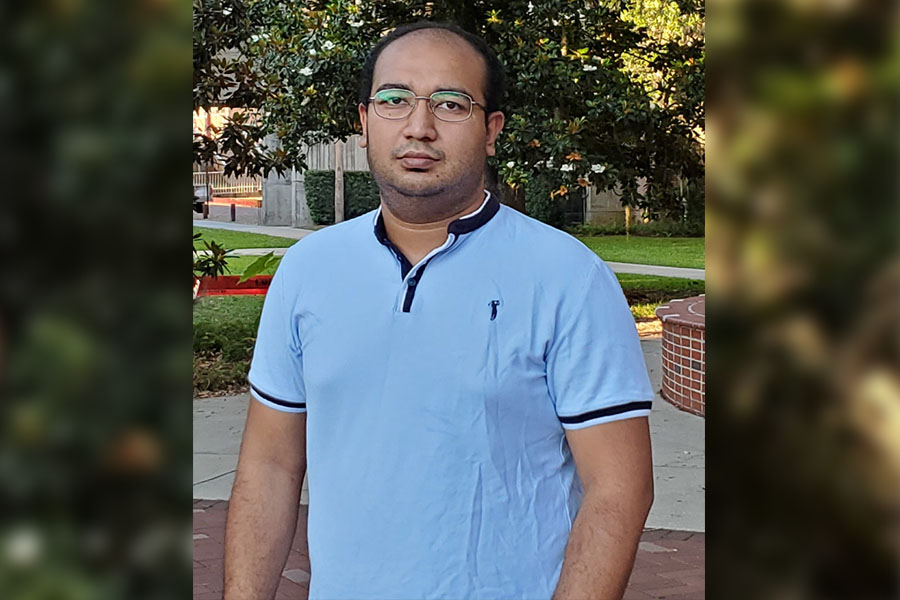Alumni Spotlight: Mustakimur R. Khandaker

Mustakimur R. Khandaker earned his doctorate from the Department of Computer Science, part of the College of Arts and Sciences, and graduated in July. Khandaker published research at prestigious conferences including ASPLOS 2020, USENIX Security 2019, and Euro S&P 2019, and has accepted the position of tenure-track assistant professor of computer science at the University of Georgia.
When did you graduate with your doctoral degree?
I started my Ph.D. in computer science in Fall 2015, and I graduated in Summer 2020.
What brought you to FSU?
I’m from Bangladesh, and I’ve always looked forward to higher education opportunities at a research-intensive university. FSU was a perfect match for me in all aspects: Distinguished research, cultural diversity, and a friendly environment. I was always passionate about working on core computer systems and was offered a position to research system and software security by associate professor Zhi Wang, my adviser. It was a dream come true, so I didn’t hesitate to accept the offer.
What inspired you to study computer science? What aspect of your area of study do you find most fascinating?
I first learned about computer science when my elder sister began to study the subject. I watched her designing systems and writing codes that solved complex problems, which inspired me to pursue CS. I gained a better understanding of the core computer system while earning my bachelor’s in computer science, and later working at Samsung Research and Development. There, I worked as an Android application developer for Samsung Smart Applications. In a team, we developed the “Artecture Draw, Sketch, Paint” application and featured new items for the Samsung Calendar, Calculator, Diary and Note applications.
The core computer system is composed of a set of tools, such as architecture, operating systems, compilers, etc. System security studies all these components so we can identify problems and take necessary security measures. This fascinates me most.
Tell me about your research.
My research focuses on system and software security. The internet connects us to the virtual world through our laptops, mobile phones, and so on. But, the back end of the virtual world is a collection of servers hosted by corporations like Facebook and Google. The safety of these servers is critical to keep our identity secured. My research targets the software running in those critical servers to protect them by identifying problems and instrumenting defense mechanisms. The goal is to protect the system although it may have unknown vulnerabilities. I completed five research projects: Two in vulnerability detection (attack) and three in system defense. They have been published at prestigious conferences such as ASPLOS and USENIX Security, and one project won the best paper award at Euro S&P.
Tell me about your paper on architectural support for programming languages and operating systems.
It is such an honor to publish peer-reviewed research work at ASPLOS 2020. We studied Software Guard Extension, or SGX, a trusted execution environment introduced by tech giant Intel, to find the weakness in developers’ implementation when they use SGX to secure their computation. We evaluated 10 popular, open-source projects and reported 52 bugs; most of them were confirmed and patched. The ASPLOS reviewers praised the comprehensive study and evaluation. They also reviewed our artifact, which is the implementation of the system that we propose in our publication and gave it two badges: “Artifact Functional” and “Artifact Available.” These acknowledged that our artifact matched the results we claimed and was open sourced. It is a great accomplishment for me.
Are there any faculty or staff who have helped and/or inspired you?
My adviser, associate professor Zhi Wang, always inspired and guided me through my struggles with my research. I also appreciate the efforts of my doctoral committee members: E.P. Miles Professor of Computer Science David Whalley, professor Xiuwen Liu, and associate professor Shuyuan Mary Ho, helped shape my dissertation. I would also thank my colleagues, who actively participated in my research discussions, and staff, who helped me with research funding and academic curriculum management.
How have you maintained your research and commitment to academic success due to the COVID-19 pandemic?
The team and I were very fortunate our research was not impacted by the COVID-19 pandemic. We are able to work from home and run our projects in our lab server. Two years ago, we established our Slack workspace for better communication handling, which has been very useful in this situation.
What do you like to do when you’re not doing schoolwork or research?
I like to garden, travel and read. My balcony houses various flowerpots. Whenever I have an opportunity to travel, I use it in full capacity. Last summer, I drove from Florida to California to begin my internship with tech company Baidu. The trip was five days long, but it was worth it. I also like to read humorous biographies and science books.
Although you might miss FSU, what are you looking forward to in your post-graduate life?
I joined the University of Georgia as a tenure-track assistant professor in the Department of Computer Science this fall. I definitely miss the vibrant environment of FSU, but I am also excited to join my new workplace at another wonderful campus. I will teach cybersecurity courses and continue my research there. I will also hire two graduate students at UGA for Spring 2021, so if anyone is interested in my research, they can contact me via my research website, mustakim.info.
What advice do you have for fellow doctoral students?
Research is hard, but there are ways to make it easier. Start early and use your first year to complete area study along with finishing your coursework. Schedule your time for research and save at least two hours a day for reading papers. Publish your research in prestigious venues and open-source your artifact and result for everyone’s access: It will help you find future collaborations and grow your research.
